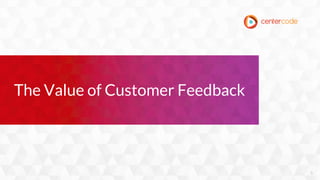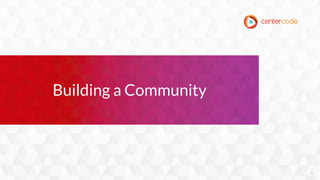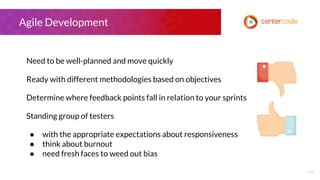Integrating the Voice of the Customer into Your Product's Development
- 1. 1 Integrating the Voice of the Customer into Your Product's Development
- 2. 2 Meet the Speaker Emily Hossellman Director of Marketing @ Centercode emily@centercode.com @ehossellman
- 3. Agenda 1. The Value of Customer Feedback 2. Building a Customer Feedback Community 3. Leveraging that Community Throughout the Lifecycle 4. Q&A 3
- 4. 4 Who is Centercode? Services Fully managed tests and programs Software Complete beta program management platform Testers Access to 150k+ deeply profiled global candidates Content Free tools and best practices Customer validation is our core competency We've been collecting customer feedback for tech companies since 2001
- 5. 5 The Value of Customer Feedback
- 6. Voice of the Customer 6 Originated in a 1993 paper by Abbie Griffin and John Hauser 1. Identify customer needs 2. In their own words 3. Organize and prioritize those needs So you can identify the problem and solve it!
- 7. Why is Customer Feedback Important? 7 You cannot build a customer-centric company without it Customer-centric companies excel Helps you make customer/data driven decisions Myth that customers don't know what they want
- 8. Why Companies Don't Do It 8 It's hard They think they know what the customer wants They don't have the systems in place to do it quickly Don't know where to find the right people Don't know what to ask
- 10. Why Do You Need a Community? 10 You can get people quickly You can pinpoint the right mix of people You have a source of fresh faces
- 11. Defining Your Target Market 11 Determine your core requirements Define your segmentations What information do you need during signup
- 12. Bringing Them Into Your Community 12 Build a sign up process Ask for detailed information Only ask for what you need Ask some open-ended questions Decide whether to NDA now or later
- 13. Finding Customers 13 Build an engaging landing page Identify the best recruitment channels ● Your customers ● Your website ● Blogs and industry sites ● User groups ● Customer/industry forums ● Twitter (organic and advertising) ● Referrals ● Early adopter sites (like Betabound)
- 14. Managing Your Community 14 Score community members Survey them Ask them to update their profiles Educate your testers Constantly grow your community Look for additional ways to maintain engagement
- 16. Leveraging Customer Feedback 1. Pre-Product 2. Design MVP 3. Agile Development 4. Alpha Stage 5. Private Beta 6. Competitive Testing 7. Public Beta 8. Launch 9. Post-Release 16
- 17. 17 Pre-Product One on one conversations (qualitative) Don't ask about features/solutions, ask about needs Look for inspiration / direction / trends Cover your segmentations, but don't go crazy Get quantitative feedback to help with prioritization
- 18. 18 Design MVP Test pieces - wireframes, logos, single features, UI Qualitative feedback - usability, focus groups Quantitative feedback - surveys, A/B testing Cheaper (and easier) to make changes early
- 19. 19 Agile Development Need to be well-planned and move quickly Ready with different methodologies based on objectives Determine where feedback points fall in relation to your sprints Standing group of testers ● with the appropriate expectations about responsiveness ● think about burnout ● need fresh faces to weed out bias
- 20. 20 Alpha Not feature-complete but major features are working Natural, in the wild usage Set expectations with stakeholders Check designs and assumptions Find lots and lots of bugs Set expectations with testers - it will be a pain to use the product Need to consider feedback bias based on alpha nature of product
- 21. Private Beta 21 Early feedback doesn't replace beta Larger group so you can get qualitative and quantitative data Get as close to your target market as possible Get as close to your final product as possible People who weren't in your earlier stages Give them more time with the product
- 22. Competitive 22 Run in parallel with private beta or pre-product Match up surveys, tasks, objectives, and features Run it like it's your product Fresh faces - no evangelists, already biased New user experience for both groups
- 23. Public Beta 23 Aim for buzz and exposure Seed with your community Large groups, light touch Still need feedback mechanisms readily available Look at backend analytics - customer usage, strain Can be side-by-side with a private beta
- 24. Launch 24 Identify evangelists to build buzz and create early reviews Build a library of user generated content Encourage transparency about their involvement Encourage them to talk honestly about your product
- 25. Post-Release 25 Both quantitative and qualitative can play a role Why did you buy it? What were you hoping to achieve? Where did it fall short? Don't just get feedback from the vocal minority
- 26. 26 Final Thoughts There are a million different ways to leverage a community You don't have to do everything - start small and build Make data-driven decisions (not based on biases and hunches) Listen to your customers - they're trying to tell you what you need to know!
- 27. 27 Q&A Emily Hossellman Director of Marketing @ Centercode emily@centercode.com @ehossellman Sign up for our newsletter and our upcoming webinars For more resources, visit our library
- 28. 28 Thank You!



























